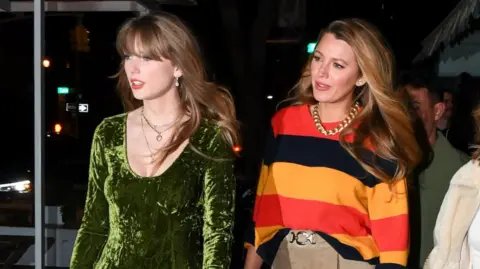In a recent legal controversy, Taylor Swift has found herself embroiled in a dispute involving actors Blake Lively and Justin Baldoni. The incident revolves around allegations that Swift was summoned to a U.S. court in connection with a sexual harassment case that has emerged from the filming of the movie “It Ends With Us.” This film, an adaptation of a novel by Colleen Hoover, has become the epicenter of a complex legal drama that features accusations of harassment and defamation.
Swift’s representatives have firmly stated that the singer, known for her numerous hit songs and significant influence in the entertainment industry, is being unfairly drawn into what they describe as a “tabloid clickbait” narrative. The specifics of the case reveal that Baldoni claims he was invited to Lively’s New York residence in 2023 to discuss script changes for the film. Accompanying him during this meeting were Lively’s husband, Ryan Reynolds, and Swift, who were both there to support Lively in what Baldoni referred to as her “dragons.”
The core of the legal dispute began when Lively filed a lawsuit against Baldoni in December 2024, accusing him of sexual harassment and running a smear campaign against her. Baldoni, in response, has counter-sued both Lively and Reynolds, making claims that include civil extortion, defamation, and invasion of privacy. This tangled web of lawsuits has left the entertainment community on edge, particularly since both actors were reportedly involved in significant re-writes of the film’s screenplay.
As the narrative intensifies, Baldoni has raised concerns over the rewriting process, claiming that the presence of Swift and Reynolds at the meeting influenced the discussions. He cites a text message from Lively drawing a parallel between herself and Daenerys Targaryen from “Game of Thrones,” stating, “If you ever get around to watching Game of Thrones, you’ll appreciate that I’m Khaleesi, and like her, I happen to have a few dragons.” This analogy was meant to express that she had allies who would stand by her—including Swift, whom she described as a supporter.
Conversely, Swift’s representatives have been adamant about her lack of involvement in the film’s production. They clarified that she was not part of any casting decisions nor did she have input on the film’s edits or final cut. Swift reportedly had no direct engagement with the project beyond permitting the use of one of her songs, “My Tears Ricochet,” asserting that she did not even view the film until weeks after its release due to her busy touring schedule.
Furthermore, the controversy escalated as it was revealed that a young actress, Isabela Ferrer, who portrayed Lively’s younger character in the film, remarked at the New York premiere that Swift had been instrumental during the audition process, later discovering how influential she had been in her casting. Nonetheless, Swift’s camp maintains that her only role was that of a featured artist within the project, allowing the use of her music.
The backdrop of this legal fiasco has prompted the singer’s team to label the subpoena as strategically designed to exploit her popularity for heightened media attention rather than focusing on the substantive issues at hand. They assert that the proceedings reflect an unsettling trend of misusing high-profile figures in legal disputes as leverage to garner public interest and, ultimately, media coverage.
This unfolding story not only reveals the intricacies of Hollywood relationships but also raises questions about the ethical implications of involving celebrity names in serious legal matters. As Taylor Swift navigates the intersecting paths of artistry and legal scrutiny, the entertainment industry watches closely, with many drawn to the layers of conflict entrenched in the evolving narrative between Lively, Baldoni, and Swift.



